Biblical wine's secrets unveiled: discover the debated fermentation mysteries and their profound impact on history and religion.
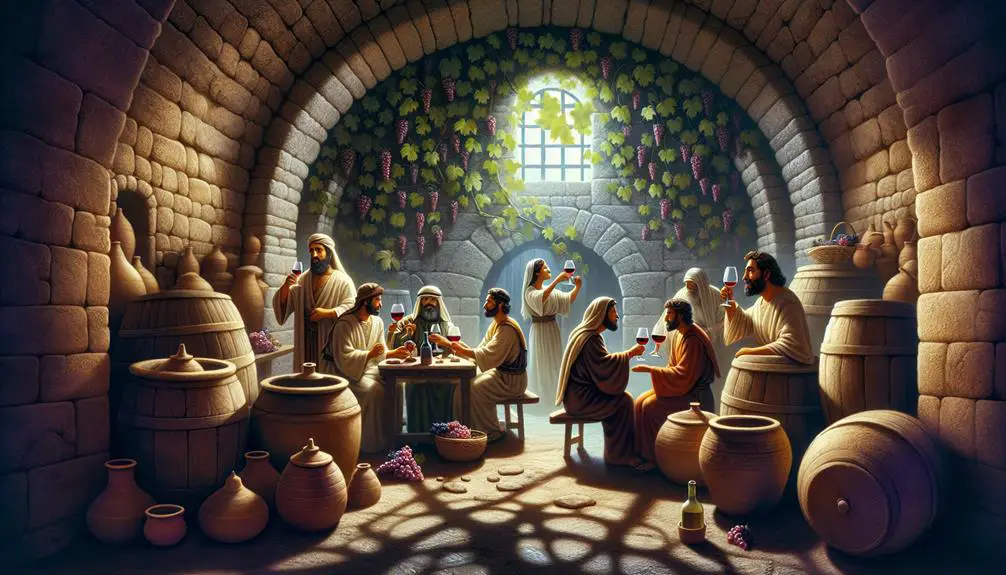
Was the Wine Fermented in the Bible
Have you ever pondered the nature of the wine mentioned throughout the biblical narrative? You're not alone in your curiosity.
The historical and cultural layers surrounding wine in biblical times are as rich and complex as the fermentation process itself. By exploring the linguistic nuances of the term 'wine' and examining ancient fermentation practices, you'll uncover insights into not only biblical references but also the broader societal implications of wine consumption.
The ongoing debates among scholars offer a fascinating glimpse into how our understanding of these ancient texts continues to evolve. Join the conversation and uncover the multifaceted role wine has played throughout history and religion.
Key Takeaways
- Biblical wine underwent fermentation, as indicated by ancient fermentation techniques and wine's symbolic roles in religious texts.
- References to wine's flavor and preservation methods in the Bible suggest knowledge of fermentation processes.
- Fermented wine's presence in rituals and celebrations, such as the Last Supper, underscores its significance and assumed fermented state.
- The varied terminology for wine in biblical languages reflects an understanding of wine's characteristics, including those from fermentation.
Historical Context of Wine
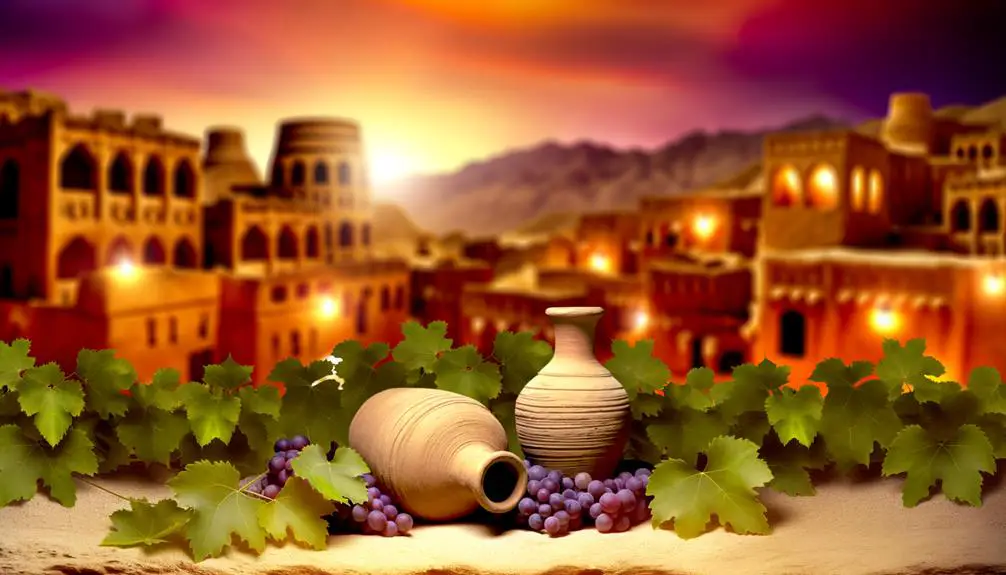
The cultivation and consumption of wine have played a pivotal role in human civilization, tracing back to ancient times when it wasn't only a dietary staple but also a symbol of cultural and religious significance. You'll find that the historical context of wine is deeply intertwined with grape cultivation, a practice that has evolved significantly over millennia. The success of grape cultivation, which is the backbone of winemaking, has always been closely tied to climate impact. Variations in temperature, rainfall, and soil types across different regions have dictated the varieties of grapes that can be grown, influencing the taste, aroma, and color of the wine produced.
Analyzing the historical trajectory of wine, it's evident that ancient civilizations quickly recognized the importance of climate in grape cultivation. They meticulously selected regions that provided the optimal conditions for vineyards, demonstrating an early understanding of terroir—a concept still critical in the wine industry today. This adaptation to climate impact has allowed wine production to flourish in diverse parts of the world, each region offering unique contributions to the global wine palette.
Moreover, the historical context of wine underscores its adaptability and resilience. As climates shifted and civilizations evolved, so too did viticulture practices. Innovations in grape cultivation and winemaking techniques have ensured that wine production could withstand the test of time. This historical analysis reveals that wine's enduring legacy isn't just a testament to its cultural and religious significance but also to humanity's ingenuity in harnessing the natural world for grape cultivation, amidst the ever-present challenge of climate impact.
Biblical References to Wine
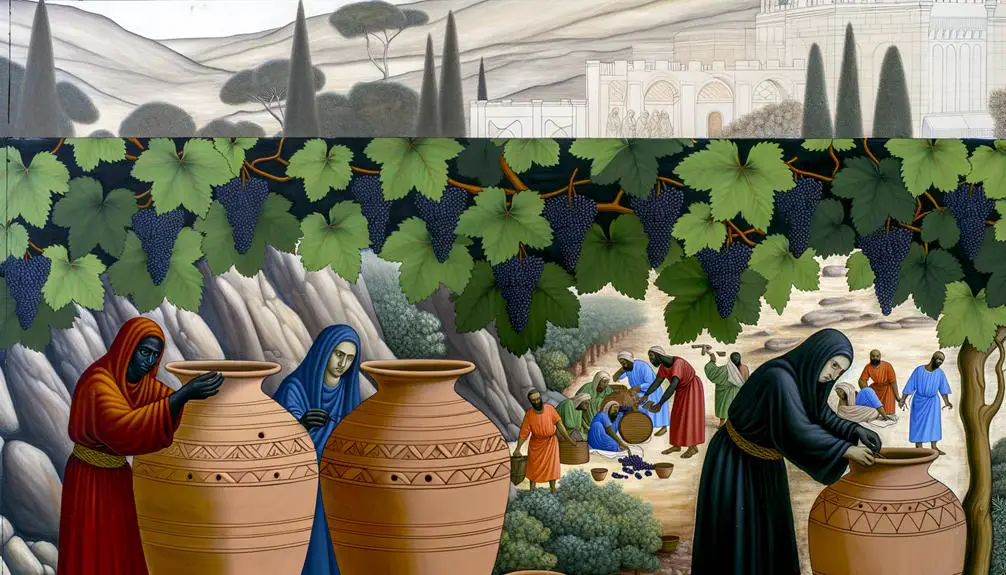
You'll find that wine plays a multifaceted role throughout the Bible, serving not only as a common beverage but also carrying deep symbolic significance.
From its ceremonial use in the Old Testament to Jesus's wine-related miracles, wine's presence underscores various theological and cultural dimensions.
This analysis will explore these aspects, shedding light on wine's symbolic role, the narrative of Jesus and wine miracles, and the historical use of wine in the Old Testament.
Wine's Symbolic Role
Throughout the Bible, wine's symbolic role emerges as a multifaceted emblem of blessing, celebration, and divine covenant. This symbolism has evolved, influencing modern symbolism and wine economics. Its representation in religious and cultural contexts underscores its enduring significance.
Reference |
Context |
Symbolism |
|---|---|---|
Genesis 14:18 |
Melchizedek brings out bread and wine |
Blessing and priesthood |
Psalm 104:15 |
Wine that gladdens human hearts |
Joy and sustenance |
Isaiah 55:1 |
Invitation to buy wine without money |
Divine generosity |
Matthew 26:27-29 |
The Last Supper |
Covenant and sacrifice |
John 2:1-11 |
Wedding at Cana |
Celebration and transformation |
Analyzing these references, one appreciates wine's deep roots in biblical narratives, revealing layers of meaning that resonate with both historical context and contemporary relevance.
Jesus and Wine Miracles
Building on wine's symbolic significance, it's crucial to explore how Jesus's miracles involving wine further illuminate its role in biblical narratives. His first recorded miracle, turning water into wine at Cana, isn't just a display of divine power but also underscores the authenticity and transformative nature of Jesus's ministry.
- Water Transformation: This act symbolizes the transformative power of faith and the new covenant between God and humanity.
- Miracle Authenticity: Critics often debate the literalness of this event, yet its inclusion highlights the importance of belief in Jesus's teachings.
- Symbolic Significance: Wine, as a symbol of joy and celebration, becomes a metaphor for the abundant life Jesus offers.
- Cultural Context: Understanding the cultural significance of wine in biblical times enriches the interpretation of these miracles and their message.
Old Testament Wine Use
Delving into the Old Testament, it's evident that wine plays a significant role in various narratives, reflecting its importance in ancient religious and social contexts.
The cultivation of grapes and production of wine are frequently mentioned, indicating a well-established tradition of viticulture. Grape cultivation, often symbolizing fertility and prosperity, was integral to the agricultural practices of the time.
Drinking rituals, too, are depicted with reverence and specificity, suggesting that wine consumption wasn't merely for pleasure but carried significant ceremonial weight.
These practices underscore the multifaceted role of wine in Old Testament societies, serving as a symbol of blessing and divine favor, while also facilitating communal bonds through shared rituals.
This context highlights the deep cultural and spiritual significance of wine in ancient times.
Linguistic Analysis of "Wine
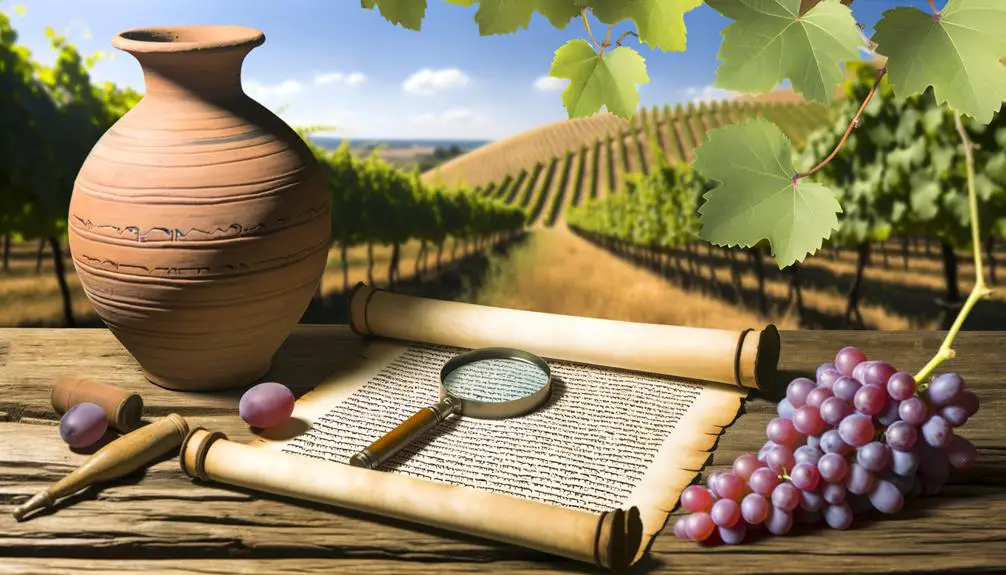
In examining the term 'wine' within biblical texts, it's crucial to differentiate between its various linguistic representations and the contexts in which they appear. The semantics of wine, along with its flavor descriptors, play a pivotal role in understanding its significance and use in ancient times. Here, you'll delve into an analytical exploration of these aspects:
- Wine Semantics: The original languages of the Bible—Hebrew in the Old Testament and Greek in the New Testament—use different words to denote wine, each carrying its own nuances and implications. For instance, the Hebrew word 'yayin' and the Greek word 'oinos' are often translated as 'wine', but the specific context can imply a range of fermented grape beverages.
- Flavor Descriptors: Biblical references to wine often include descriptors that give insight into its quality, taste, and purpose. Terms like 'sweet' or 'strong' not only describe the wine's flavor profile but also its potency and potential effects on the drinker.
- Cultural Context: The linguistic analysis must consider the cultural context in which these terms are used. Wine was a staple in ancient diets and held religious, medicinal, and social significance, influencing how it was described and understood.
- Translation Challenges: Translating ancient texts poses challenges, especially when it comes to accurately conveying the nuances of wine-related terms. Scholars must consider the broader cultural and historical context to provide a faithful interpretation.
Through this linguistic analysis, you gain a deeper understanding of how wine was perceived and used in biblical times, beyond its mere mention as a beverage.
Fermentation Practices in Antiquity
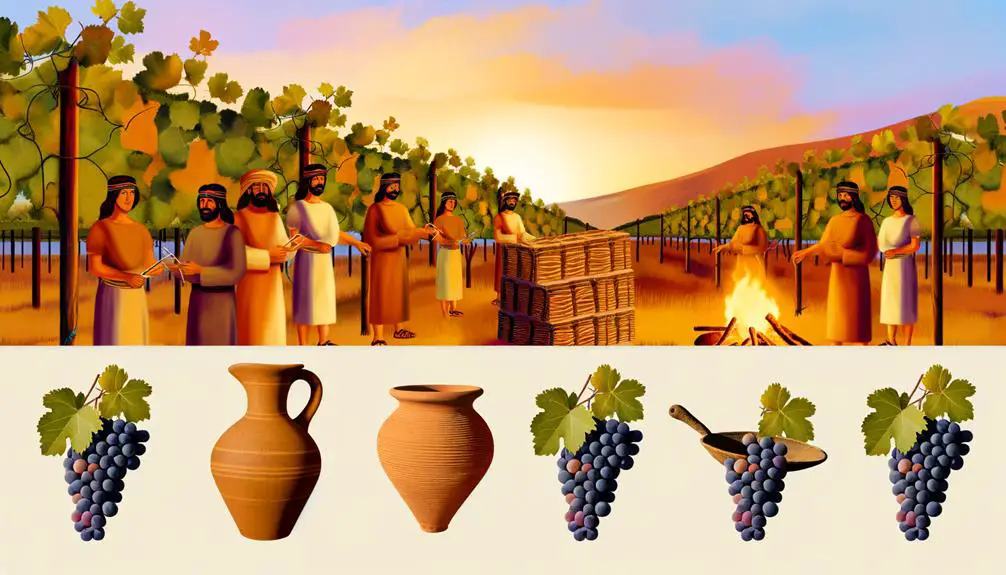
You'll find that ancient fermentation techniques were both diverse and sophisticated, reflecting a deep understanding of the natural processes at play.
The characteristics of biblical wine, shaped by these methods and the ingredients available, offer insights into the cultural and religious practices of the time.
Analyzing the historical brewing ingredients further uncovers the complexity and regional variations of ancient wine production.
Ancient Fermentation Techniques
Understanding ancient fermentation techniques reveals that early civilizations possessed sophisticated knowledge and skills for producing alcoholic beverages, including wine. These communities harnessed the natural process of fermentation, manipulating variables with precision to create desired outcomes. Here are key facets of their approach:
- Yeast Origins: They capitalized on wild yeasts present in the environment, recognizing their indispensable role in fermenting juices into alcohol.
- Temperature Control: By observing and adjusting the ambient temperature, they optimized the fermentation process, understanding that too much heat or cold could halt it.
- Sanitation Practices: They intuitively grasped the importance of cleanliness in containers to prevent spoilage.
- Storage Solutions: Techniques were developed for storing the fermented beverages, prolonging their shelf life and enhancing flavors over time.
This analysis underscores the complexity and ingenuity behind ancient fermentation practices.
Biblical Wine Characteristics
Building on the foundation of ancient fermentation techniques, it's crucial to explore the specific characteristics of wine mentioned in biblical texts, highlighting how these practices were adapted and refined in antiquity.
You'll find that wine preservation methods were vital, with techniques aimed at extending the shelf life of wine through natural fermentation processes and the addition of substances that would inhibit spoilage. Different grape varieties, known from historical records, were selectively cultivated in the Middle East, contributing uniquely to the flavor profiles of the wines produced.
These varieties were chosen for their resilience and adaptability to the climate, which played a significant role in the quality and consistency of wine. The biblical narrative, therefore, not only documents the cultural importance of wine but also reflects an understanding of viticulture and oenology in ancient times.
Historical Brewing Ingredients
Delving into the realm of ancient fermentation practices reveals a diverse array of ingredients that were pivotal in brewing wine in antiquity. The choice of ingredients wasn't merely a matter of availability but also reflected the technological and cultural sophistication of the time.
- Grapes and Wild Yeasts: The foundation of winemaking, with variations in grape types affecting flavor profiles.
- Honey and Fruits: Used to introduce additional sweetness or ferment into meads and fruit wines, respectively.
- Malt Variations: Different grains were malted to create a range of flavors and alcohol content in beers.
- Hops Introduction: Though later in the timeline, hops revolutionized brewing by adding bitterness to balance sweetness and acting as a preservative.
These components underscore the complexity and evolution of ancient fermentation practices.
Scholarly Perspectives on Biblical Wine
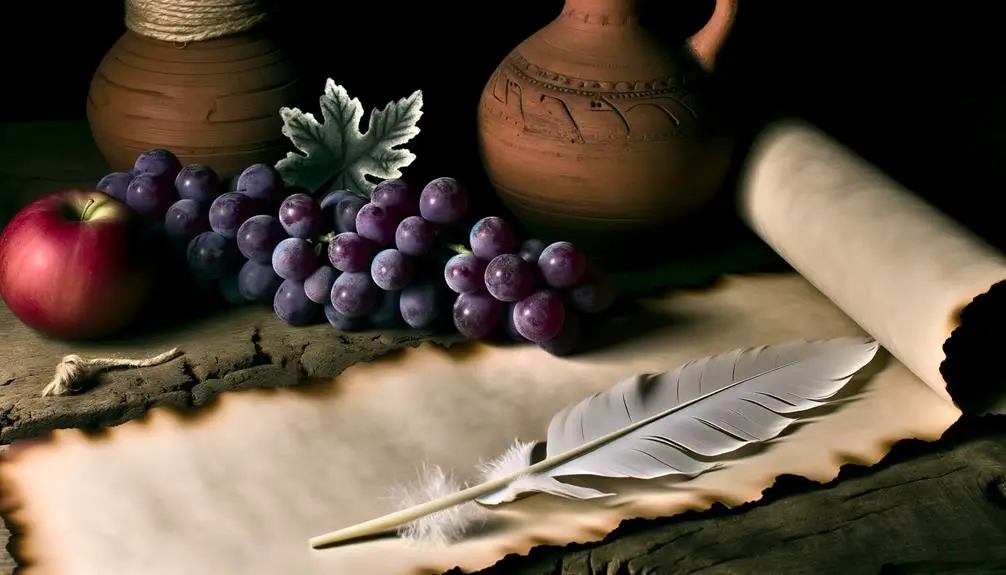
How do scholars interpret references to wine in biblical texts, and what implications does this have for understanding its role in ancient societies?
You'll find that scholars delve deeply into the context and linguistics of biblical references to unravel the nuances of wine's significance. Their analyses shed light on grape cultivation and alcohol consumption, which are pivotal in understanding the economic, religious, and social fabrics of the times.
Grape cultivation, central to the agricultural practices of ancient societies, receives considerable attention. Scholars argue that the frequent mention of vineyards and wine in biblical texts underscores the crop's economic importance. It wasn't just about producing a beverage; it was about cultivating a commodity that was integral to trade and sustenance. This perspective helps you appreciate the sophistication involved in ancient agricultural practices and the central role of wine in economic life.
Alcohol consumption, as depicted in biblical narratives, is another focal point for scholars. They explore the contexts in which wine was consumed, suggesting that it played a complex role in rituals, social gatherings, and daily life. The examination of these texts reveals a nuanced understanding of how wine was perceived and used—ranging from a sacred element in religious ceremonies to a common staple at meals. This scholarly discourse illuminates the multifaceted role of wine, showing it as a substance that could symbolize joy, festivity, and divine blessing, as well as cautionary tales of excess.
Cultural Significance of Wine
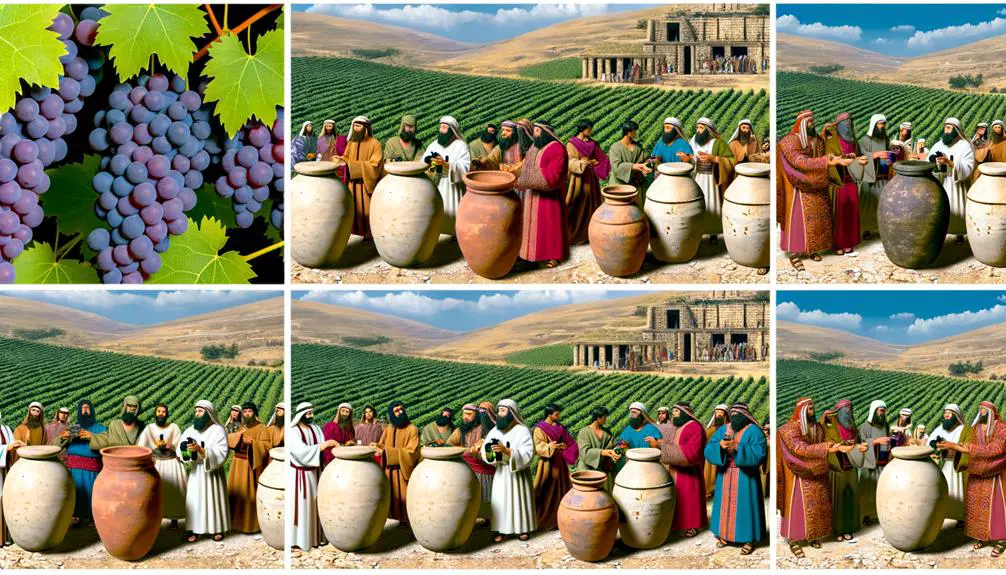
Exploring the cultural significance of wine in ancient societies reveals its role not only in daily consumption but also as a symbol of wealth, social status, and religious observance. The intricate relationship between humans and wine stretches back thousands of years, deeply rooted in the practices of grape cultivation and the rituals of ancient civilizations. This connection is evident in the numerous archaeological findings and historical records that document the use of wine in various cultural ceremonies and daily life.
To appreciate the multifaceted role of wine, consider the following aspects:
- Grape Cultivation: The cultivation of grapes for winemaking significantly contributed to the agricultural economy of ancient societies. It necessitated a profound understanding of the land, climate, and techniques for cultivating vines, underscoring the importance of wine in economic and social development.
- Social Status: In many cultures, the consumption of wine was a marker of social status and wealth. The ability to afford and offer fine wine was a sign of prosperity and a means to distinguish oneself in society.
- Religious Observance: Wine played a central role in religious ceremonies and offerings. Its use was often prescribed by religious texts and laws, which sometimes included religious prohibitions against its misuse or overconsumption.
- Cultural Practices: Beyond its consumption, wine influenced various cultural practices, including festivals, culinary traditions, and social gatherings. It served as a symbol of hospitality, community, and the joys of life.
Understanding the cultural significance of wine in ancient times provides insight into its enduring presence in human history, despite the challenges posed by religious prohibitions and changing social norms.
Modern Interpretations and Debates
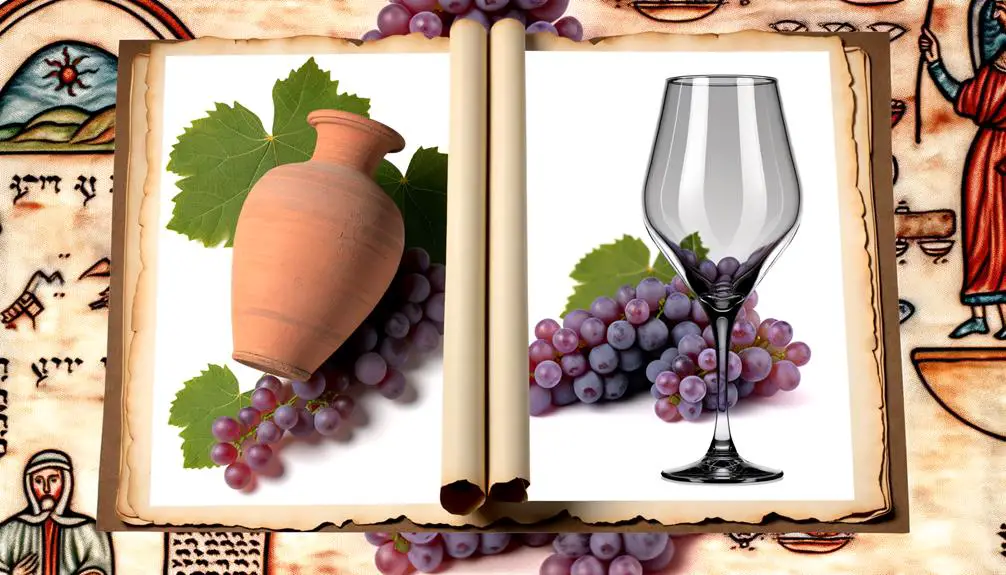
While the historical significance of wine is well-documented, contemporary debates and interpretations challenge our understanding of its role in modern society. The intersection of ancient practices with modern teetotalism and evolving alcohol policies presents a complex landscape for scholars and policymakers alike.
Modern teetotalism, or the complete abstinence from alcohol, draws upon various motivations including health concerns, religious convictions, and social responsibility. This movement contrasts sharply with the biblical depiction of wine as a symbol of joy and blessing. Scholars argue that the positive biblical references to wine can't be directly applied to today's context without considering the dramatic changes in societal norms and the understanding of alcohol's impact on health.
On the other hand, alcohol policies have become a battleground for interpreting the societal role of beverages like wine. Legislation often reflects a balance between respecting cultural heritage and addressing the challenges of alcohol abuse. These policies are informed by a growing body of research that underscores the potential harms of excessive alcohol consumption, alongside its cultural and religious importance.
The debate extends into academic circles, where researchers analyze the implications of biblical references to wine in light of modern knowledge about addiction and public health. This scholarly work aims to reconcile historical texts with contemporary ethical standards, leading to nuanced interpretations that respect both tradition and the well-being of society.
Frequently Asked Questions
How Did the Climate and Geography of Ancient Israel Influence the Types of Grapes Grown for Wine Production?
You're diving into how ancient Israel's climate and geography impacted grape varieties for winemaking. Modern viticulture shows that these factors still play a crucial role.
Back then, the warm, dry climate and diverse terrains, from coastal plains to highlands, dictated the grape types that thrived. Current irrigation methods weren't available, so natural rainfall patterns and soil types were key in determining which grapes could be cultivated for wine production.
Were There Any Notable Differences in Wine Consumption Patterns Between Different Social Classes in Biblical Times?
In biblical times, the tapestry of wine consumption painted a vivid picture of social class distinctions. Royals and priests often indulged in wine as part of religious rituals, showcasing its sacred status.
On the other hand, common folks adhered to stricter drinking laws, reflecting societal norms and economic capabilities. This hierarchy in wine consumption not only highlights the beverage's significance but also mirrors the broader social structures of the era.
How Did Ancient Wine Storage Techniques Impact the Taste and Quality of Wine Compared to Modern Methods?
Ancient wine storage techniques significantly impacted the taste and quality of wine. Without modern preservatives, these wines had a different profile, often aging in clay jars or amphorae, which allowed some air exchange, influencing taste.
Compared to today's methods, such as bottle aging in controlled environments, ancient wines likely had more variation and less predictability in flavor. The lack of precise temperature control also meant the aging process was less consistent, affecting overall quality.
Are There Any Specific Health Practices or Beliefs Associated With Wine Consumption Mentioned in Non-Biblical Ancient Texts From the Same Era?
In ancient texts beyond the Bible, wine symbolizes not just celebration but a deep intertwining with health and ritual. These documents reveal that ancient diets often included wine, believed to purify and heal, playing a crucial role in ritual ceremonies.
Analyzing these texts, you'll find a scholarly treasure trove of practices and beliefs, where wine's essence transcends mere consumption, embodying a spiritual and physical health component integral to ancient life.
Did Ancient Winemaking Techniques Include Any Unique Additives or Flavorings Not Commonly Used in Today's Winemaking Processes?
You're delving into how ancient winemaking techniques might've involved additives or flavors not seen in modern practices.
When exploring grape cultivation and fermentation methods from antiquity, it's clear that winemakers experimented extensively. They often incorporated herbs, spices, and even resin to enhance flavor and preservation.
These practices contrast sharply with today's more standardized methods, reflecting a rich tradition of innovation and adaptation in the pursuit of crafting unique and memorable wines.
Conclusion
You might argue that biblical 'wine' could merely be grape juice, but the historical and linguistic evidence strongly suggests otherwise. The term used in ancient texts, coupled with the known fermentation practices of the time, indicates that what was referred to as 'wine' was indeed a fermented beverage.
Scholars broadly agree that the cultural and religious significance of wine in biblical times was tied to its intoxicating properties. Thus, despite modern debates, it's clear that the Bible's references to wine indeed point to a fermented drink.


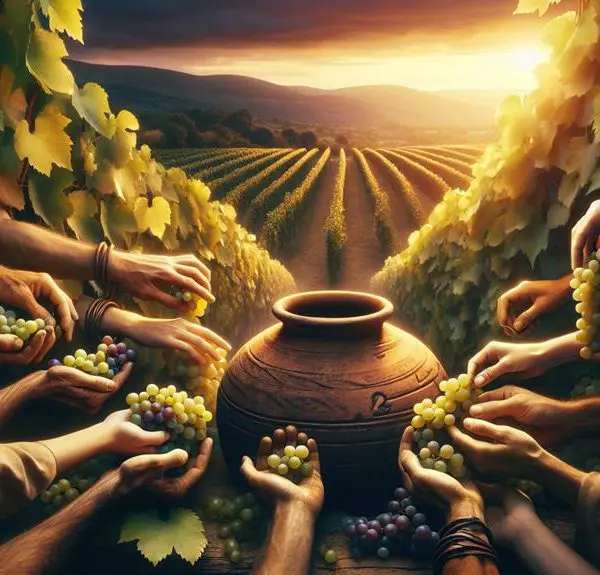
Sign up